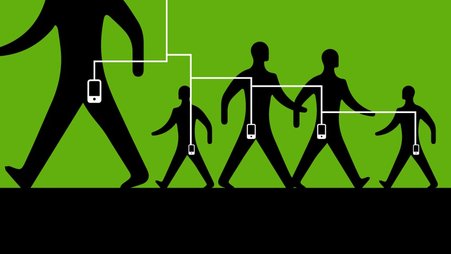Director Laura Poitras’ highly anticipated new documentary on Edward Snowden and the NSA, entitled Citizenfour, debuted at the New York Film Festival over the weekend. The film is an extraordinary look inside the mind and motivations of whistleblowers, and enthrallingly captures how the NSA disclosures transformed the world’s view of privacy and government surveillance in the past year and a half. (It also includes some new revelations.)
But since the director, as well as two of the main participants in the film, are on our board of directors, you shouldn’t just take our word for it. Instead, read these early reviews from film critics with no connection to the privacy and surveillance world. And make sure to bring any friends or relatives skeptical about Snowden or NSA reform to see it on October 24th when it’s released nationwide.
Seamless and as darkly riveting as any John le Carré or Graham Greene thriller, Laura Poitras’ Citizenfour puts an indelibly human face on NSA whistleblower Edward Snowden, while ripping away any mask of pretense that the most massive and sophisticated breach of privacy in American history had grounding in reality, let alone the law.
Almost defiantly avoiding most of the technological gimcrackery we’ve come to expect in advocacy filmmaking, and rushed to completion (though never looking it) in time for its world premiere last night at the 52nd New York Film Festival, Citizenfour is likely to open the eyes — not to say change the minds — of doubters who would like to see Snowden tried for treason. (Read the full review.)
No amount of familiarity with whistleblower Edward Snowden and his shocking revelations of the U.S. government’s wholesale spying on its own citizens can prepare one for the impact of Laura Poitras’ extraordinary documentary “Citizenfour.” Far from reconstructing or analyzing a fait accompli, the film tersely records the deed in real time, as Poitras and fellow journalist Glenn Greenwald meet Snowden over an eight-day period in a Hong Kong hotel room to plot how and when they will unleash the bombshell that shook the world. Adapting the cold language of data encryption to recount a dramatic saga of abuse of power and justified paranoia, Poitras brilliantly demonstrates that information is a weapon that cuts both ways. (Read the full review)
[N]o matter one's personal stance about what Snowden did, this revelatory work is fascinating and thought-provoking, if, at the same time, oddly lacking in tension; unlike the provocations of Michael Moore or Oliver Stone, the temperature of this film is very cool. Its massive news value, which includes the bombshell suggestion that the chain of command for electronic spying goes all the way to the Oval Office, makes this one of the major and defining documentaries of recent times. (Read the full review)




